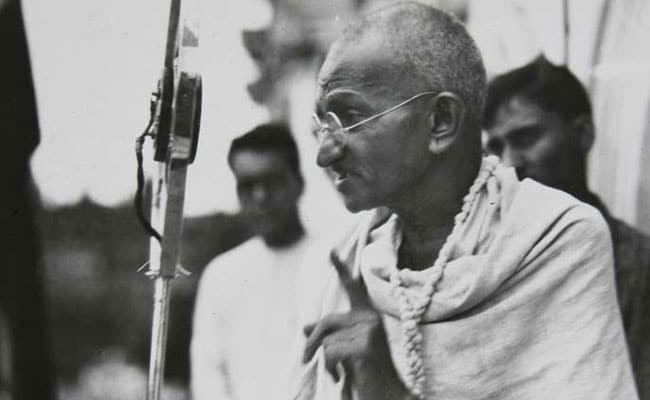Mohandas Karamchand Gandhi, the Father of the Nation, often proudly proclaimed to be a Hindu - not just a Hindu, but a proud Sanatani Hindu. In his soul, thoughts and action, he was a Sanatani Hindu. He saw Sanatan Hinduism as a source of inspiration for his life. He was born as a Sanatani Hindu and died as a Sanatani.
Born into an orthodox Hindu upper caste family in Porbandar, Gujarat, he was raised in Sanatani culture, and imbibed Sanatani Hindu traditions and practices, and he carried these influences throughout his life. In his articles in Harijan, he says that Sanatan is a set of all pervading, timeless and universal values of mankind, which has evolved in this land of Bharatvarsha. For him, Hinduism and Sanatan are one and the same thing, a synonymous.
For him, Sanatan Hinduism was not a religion confined within narrow boundaries but a philosophy that embraced all humankind. What's most interesting is that he never held back on or felt shy of his Sanatani identity. He referred his faith as Sanatan Hindu Dharma. This term emphasizes the timeless and universal nature of Hinduism, describing it as an all-inclusive way of life rather than a rigid religion.
Gandhi defined Sanatan Hindu Dharma as a vast ocean which encompasses various streams, rivulets, rivers, and is very broad. It is not circumscribed like the proverbial frog in the well. For him, Sanatan is broad, comprehensive and all inclusive. It is not a religion in the Western sense - rather a way of life. It is humankind. In his famous article in Harijan, he says that Sanatan Hinduism is the most tolerant religion of the world. "It gave shelter to early Christians who had fled persecution, also to the Jews known as Beni-Israel, as also the Parsis. I am proud to belong to this Sanatan Hinduism which is all inclusive and which stands for tolerance".
He wanted to reform some of the ills of Sanatan, like untouchablity and caste-orthodoxy, but these reforms are to be carried out from within and without abandoning the core values of the Sanatan. He believed that these issues were deviations from the core values of Hinduism. He worked tirelessly to reform these practices within the Hindu community. For him, Sanatan Hinduism stands for its universality, tolerance, and commitment to non-violence. One must remember that Gandhi considered all those who lived in India to be Sanatani Hindu, no matter their faith.
For him, the purpose of life was to follow Dharma, Artha, Kama and Moksha. No other book or scripture influenced Gandhi, shaped his character, and transformed his life as profoundly, penetratingly, and permanently as did the Bhagavad Gita. Among the many books he read, the Gita influenced, impressed and shaped him the most, in the darkest hours of his life. He saw the Gita as his "eternal mother", whom he esteemed even more than his earthly mother. He says that he learnt two major life lessons from the Gita.
First, to master the skill of action and second, like a sthitaprajna, to remain balanced or equipoised in success or failure. Testing the truth of anything means living by its precepts in real life, and actualising the ideals on the human, material plane of day-to-day living. With the same idea of emulating the truth, Gandhi began to translate the Gita not only literally, but even practically. He lived the Gita in his action, thoughts and practice. Believing in "being the change you want to see in the world," he himself put into practice the Gita's ideals of the yamas and niyamas such as truth, ahimsa (non-violence), Brahmacharya (celibacy), non-possession, and others.
His daily practices and daily routine were just an extension of Sanatani values. Ahimsa and Satyagraha (fight for truth) are core Sanatan values.
His concept of trusteeship of wealth, in which the wealth earned by a person is not his personal wealth and he is just a trustee, has been directly influenced by the Sanatani concept of Dharma.
In essence, Mahatma Gandhi's steadfast adherence to Sanatan Hinduism was a guiding force that underpinned his commitment to thr universal values of tolerance, non-violence, and truth. His legacy continues to resonate, transcending religious boundaries and inspiring people worldwide.
There is and cannot be a more proud and ardent follower of Sanatan-Hinduism than the Father of the Nation.
(Rajiv Tuli is an author and commentator.)
Disclaimer: These are the personal opinions of the author.






Leave a Reply